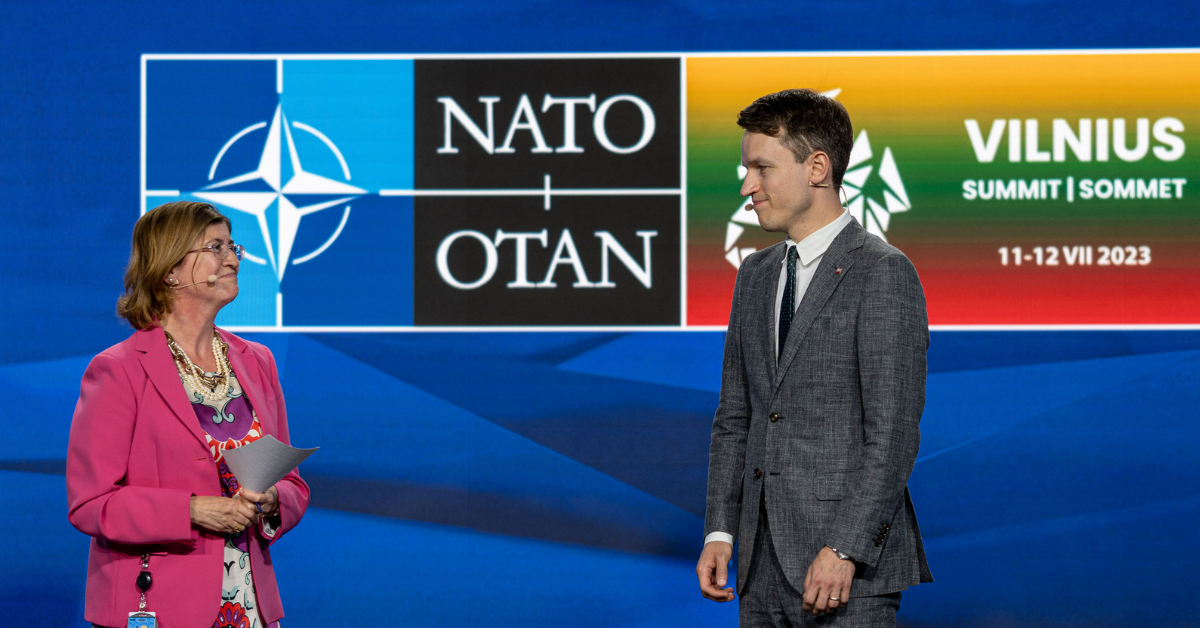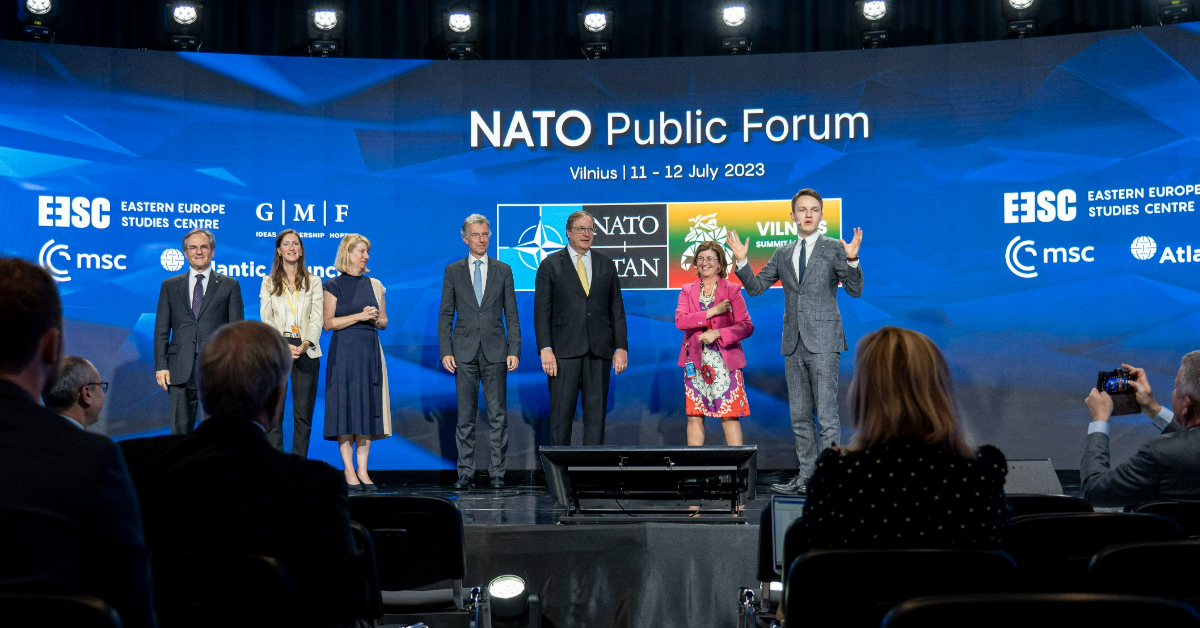NATO Public Forum 2023
Political Capital is an institutional partner in Hungary of the NATO Public Forum, the public event organised during the NATO Summit will take place in Vilnius, Lithuania. The event organised jointly by NATO, Eastern Europe Studies Centre (EESC), The German Marshall Fund of the United States, Munich Security Conference and Atlantic Council.
Brief summaries and take aways of the panels of NATO Public Forum.
Day 1
Welcome Remarks
Carmen Romero, NATO Acting Assistant Secretary General for Public Diplomacy
Russia continues its brutal war against Ukraine. We are facing a dangerous and competitive security environment: core principles of our security and a rule-based international order are increasingly contested. The leaders of our alliance will thus be taking very important decisions in Vilnius.
Linas Kojala, Director of Eastern Europe Studies Centre
It’s going to be an exciting event! We gonna have discussion on support for Ukraine, on deterrence and defence, on technology and climate change, all the things that are on the agenda for political leaders.
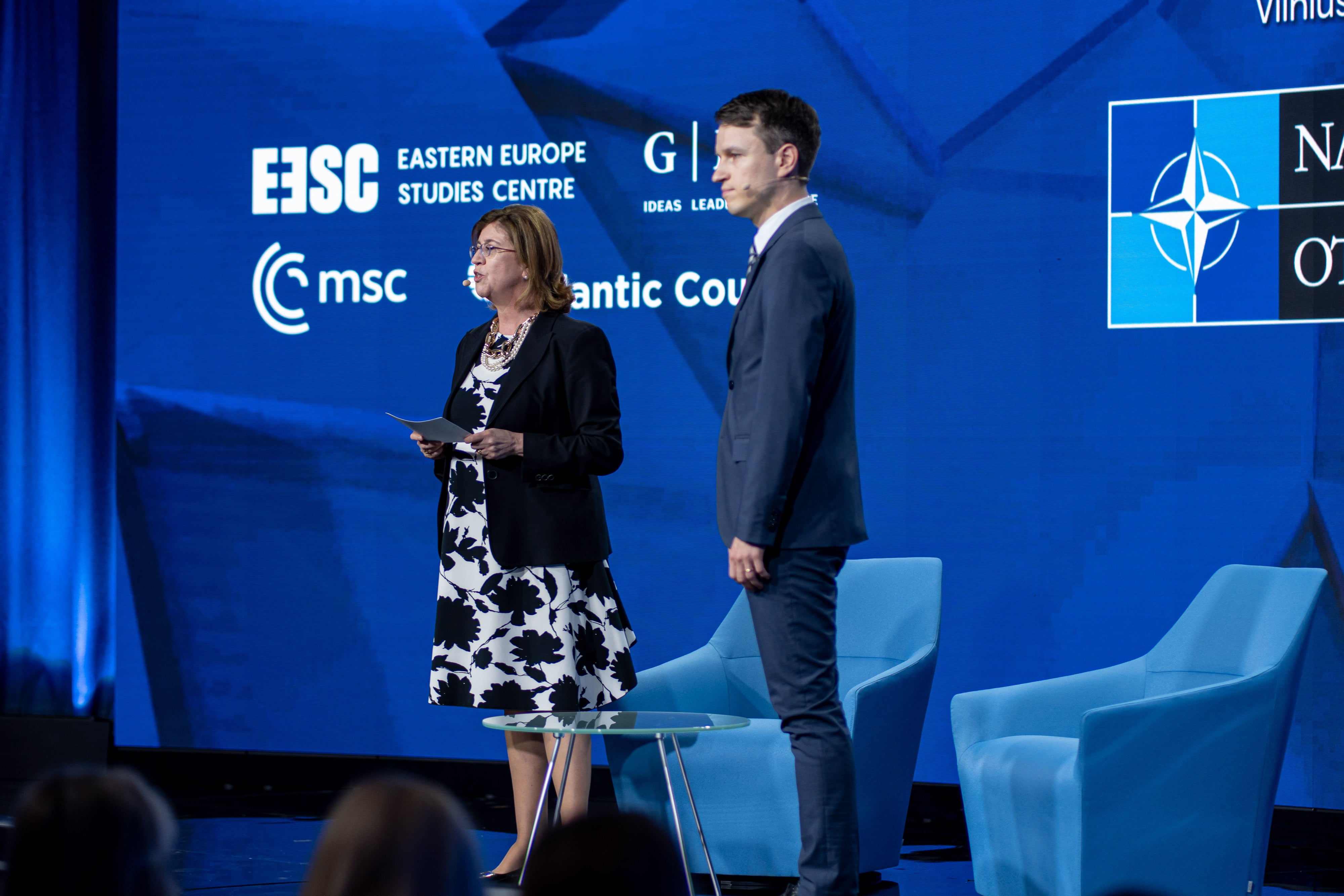
Conversation with the NATO Secretary General
Mircea Geoană, NATO Deputy Secretary General
There is nothing more fundamental for our alliance and for the free world than to maintain our technological edge. It’s the essence of who we are, the essence of our economies and our militaries. This is something the NATO is doing.
Technological edge is the underpinning of everything we do in defense, in economy, in society, in democracy. So i would like everyone to know that we do our best to move forward.
We do not want NATO to be a substitute for what national governments, private sector or academia are doing. We are acting as a catalyst for harnessing the innovation ecosystem across our great alliance.
The business of NATO is to keep 1 billion citizens safe. Security is the foundation of prosperity, security is the foundation of democracy, security is the foundation of normal life for our citizens.
Ukrainians are learning a lot from us: commandant control, NATO doctrine, how to use smart equipments and they are moving away from the Soviet era […] But we are also learning from them. And not only us, our military, but also our private sector.
NGOs are working embedded in the Ministry of Defence of Ukraine like we do not do in NATO.
Over the last 20-25 years, many allies, especially European allies, have been collecting the peace dividend, and there was not so much need to invest in industrial base, in our militaries - now we need to do that.
There is a new geopolitical and geoeconomic reality around the world, not only in Europe, around the world. We’ve seen this with the pandemic, we’ve seen this with the financial crisis, now we are seeing it with the war in Europe, we are seeing a different landscape in geopolitics and geoeconomics.
The Vilnius summit will be remembered as one of the most successful summits we’ve had in some time and this is why we are here.
The very definition of security is changing dramatically: we have cyber, we have space and we have climate as space of security.
Moderated by Benedikt Franke, Vice-Chairman and CEO, Munich Security Conference
We at NATO, we in the alliance are certainly at crossroads when it comes to innovation. I’m wondering, are we taking the right turn, are we going in the right direction, are we learning the right lessons about innovation from the war in Ukraine?
A lot of us in Europe are sitting on the fence when it comes to defense particularly when it comes to investment. So how do we get more PLUTOs in Europe, how do we increase investment in innovation?
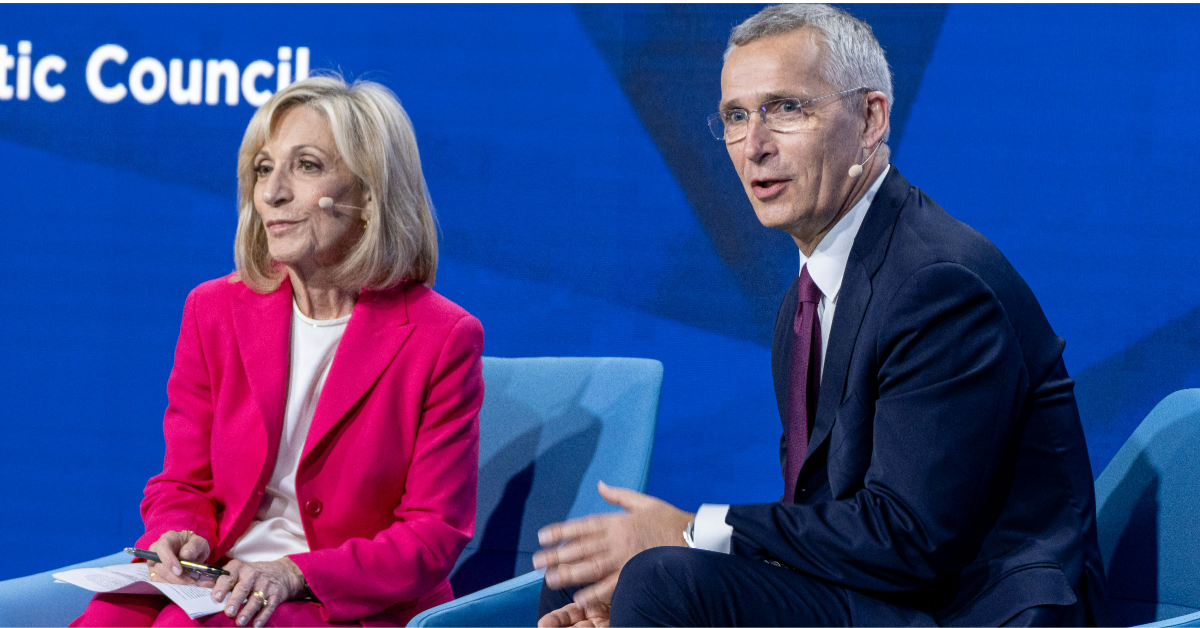
Special Address - Gitanas Nausėda
Gitanas Nausėda, President of Lithuania
We are meeting in the city that is only several hundred kilometers away from the front line of the cruel and devastating war in Ukrfaine still being waged by Russia.
The security of alliance is indivisible. Every inch of the allied territory will be collectively defended from day one. We will work relentlessly to further improve our deterrence and forward defence.
Ukraine’s rightful place is in NATO. We must deepen political and practical bonds with Ukraine, defining a clear preference towards Ukraine’s membership in NATO.
Russia poses the most significant and direct threat to our alliance, therefore deterring and containing Russia remains a key task for the foreseeable future. NATO is rising to that challenge.
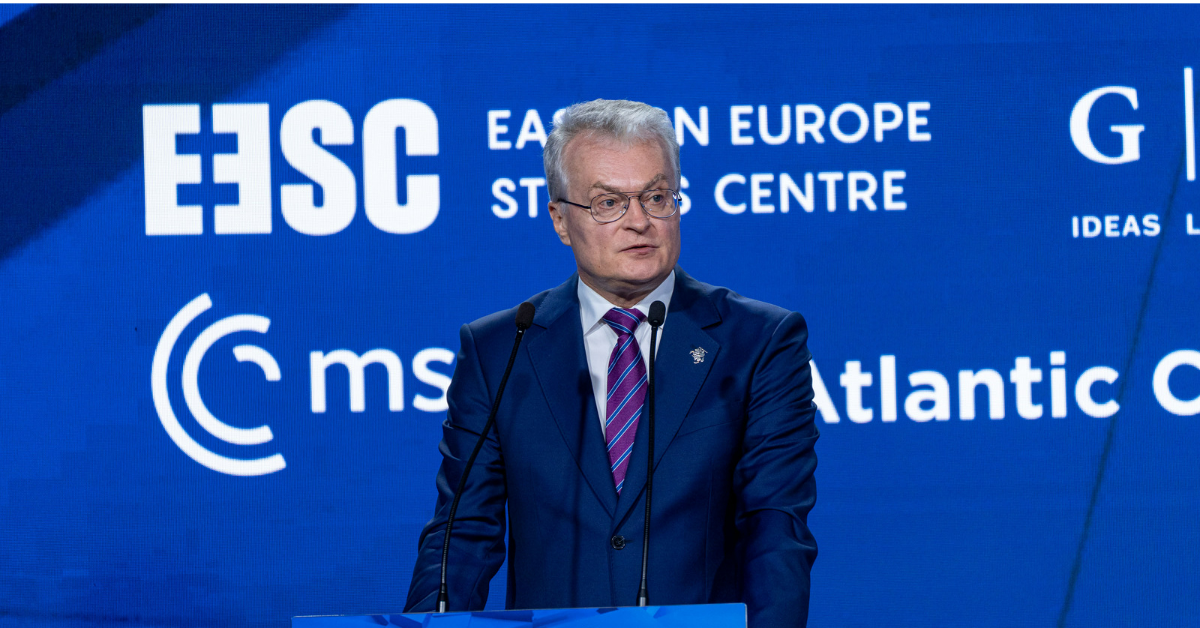
Defending Forward: Adapting NATO's Deterrence and Defence for the Looming Threats
Justin Trudeau, Prime Minister, Canada
One of the things that our citizens across all countries are understanding right now is that the world is changing and not necessarily in reassuring ways: the aggressive posture of Russia, and its invasion of Ukraine, but also the rise of authoritarian powers that are trying to push the limits of the rule-based order.
We must be absolutely unequivocal in standing up for them (red. aggressors and authoritarian regime) and bringing our citizens alone.
Holding and strengthening NATO’s eastern flank against Russia is unbelievably important.
Canadas has been unequivocal from the very beginning on support of Ukraine not just because we have the largest Ukrainian diaspora outside of Russia and have for a 100+ years been welcoming Ukrainians settling our prairies but also because standing up to Russia is standing up against any country with a slightly larger army that has desires on its neighbor’s territory which would lead to chaos and destabilization around the world.
As a matter of principle and friendship, Canadians are absolutely firm on our support of Ukraine including on welcoming Ukraine to NATO when the conditions allow.
I am fairly confident that where we’re gonna get here in this meeting will give that clear support to Ukrainians so they know there is light at the end of the tunnel.
Krišjānis Kariņš, Prime Minister, Latvia
Today we are training Ukrainians and I am convinced that tomorrow they will be training us because which army now has the experience of fighting the Russians? It is the Ukrainians. They are fantastically adaptable to all weapon systems.
Remember that Russia only understands strength and power. And the reason they are fighting the war in Ukraine is because they have wrongly perceived Ukraine to be a weak and easy target.
I don’t think that anyone seriously thinks that even Wagner 6000 soldiers will now be a direct military threat to NATO. But imagine even 500 well-trained ruthless mercenaries attempting the migrant riot and what they would do if came into Europe. Our awareness on the border in Latvia, Lithuania and Poland is well-situational and we need to keep that heightened.
NATO’s value-add is our preparedness and Russia understands that preparedness.
For me it seems very simple, we want peace in Europe and there are two ways to get there. One very theoretical that something massively changes in Russia, I am not holding my breath. The second is get rid of the gray areas and make it very clear to Russia where their limit is and that is NATO. Only when Ukraine is in NATO, will we be able to have stable peace.
Only when Ukraine will be in NATO we will be able to have a stable peace. It is not a complete peace because Russia will still be there, Russia will still be a threat, but it is only then. So to me it seems only obvious that this has to be the exit of this conflict that an independent and liberated Ukraine becomes a member of NATO. The only way for a stable peace.
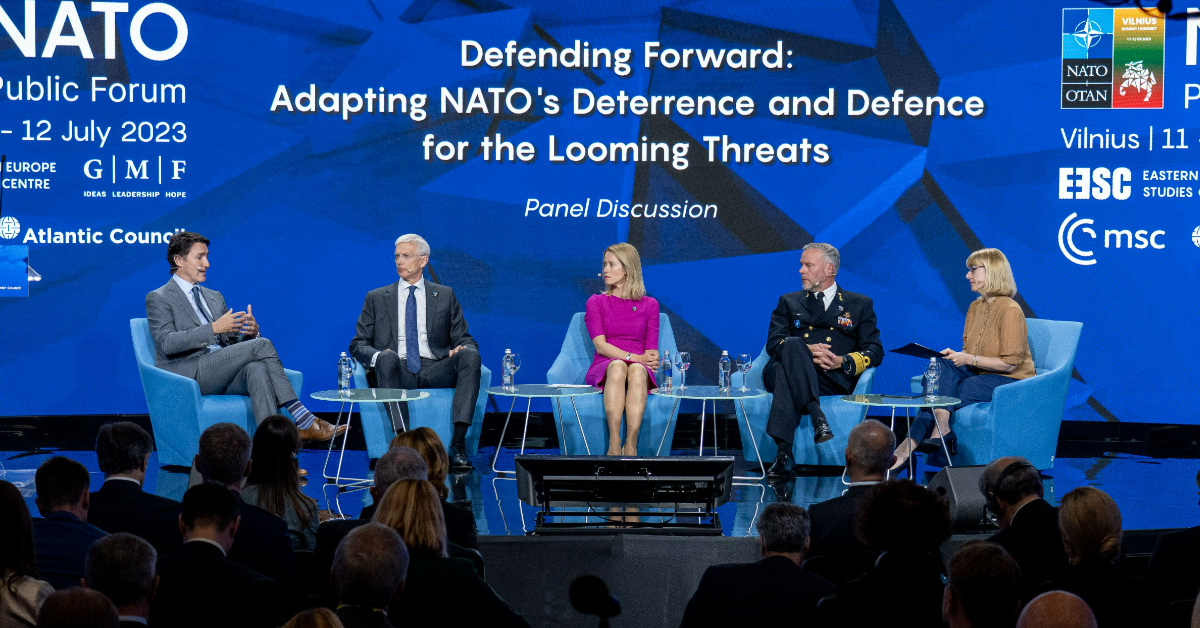
Kaja Kallas, Prime Minister, Estonia
The threat is real and we have to do more.
What we really have to do is boost our own defense spending and that means also giving assurances to the defense industry to boost their production.
In order to be really ready to defend ourselves, we have to fulfill those plans with the military capabilities.
The Ukrainians are fighting for us so that the Americans, Canadians, Latvians and Estonians don't have to do that…They are the only army that has the actual experience of fighting the Russians right now.
The only security guarantee that is the cheapest and that really works in a NATO membership. Our countries are a living example to it.
Adm. Rob Bauer, Chair of the Military Committee, NATO
Time is of the essence here. It is historic now that we have much better plans for collective defense.
The work starts tomorrow after the decision and after the summit ends. We all have to start doing to make it work, it will be difficult because it is not a switch, it’s a path from where we are to where we need to go.
If the threat changes, then we will adapt those plans, we will have to respond to the change and that is what we will continue to do.
Moderated by Heather Conley, President, German Marshall Fund of the United States
This conversation about defending nato and the generational shift in thinking is the most important thing we’re going to talk about.
Are we not thinking sufficiently about how the Ukrainian military, when they are in NATO, will actually be a huge additive to protecting NATO Eastern flank?
Conversation with the NATO Deputy Secretary
Mircea Geoană, NATO Deputy Secretary General
There is nothing more fundamental for our alliance and for the free world than to maintain our technological edge. It’s the essence of who we are, the essence of our economies and our militaries. This is something the NATO is doing.
Technological edge is the underpinning of everything we do in defense, in economy, in society, in democracy. So i would like everyone to know that we do our best to move forward.
We do not want NATO to be a substitute for what national governments, private sector or academia are doing. We are acting as a catalyst for harnessing the innovation ecosystem across our great alliance.
The business of NATO is to keep 1 billion citizens safe. Security is the foundation of prosperity, security is the foundation of democracy, security is the foundation of normal life for our citizens.
Ukrainians are learning a lot from us: commandant control, NATO doctrine, how to use smart equipments and they are moving away from the Soviet era […] But we are also learning from them. And not only us, our military, but also our private sector.
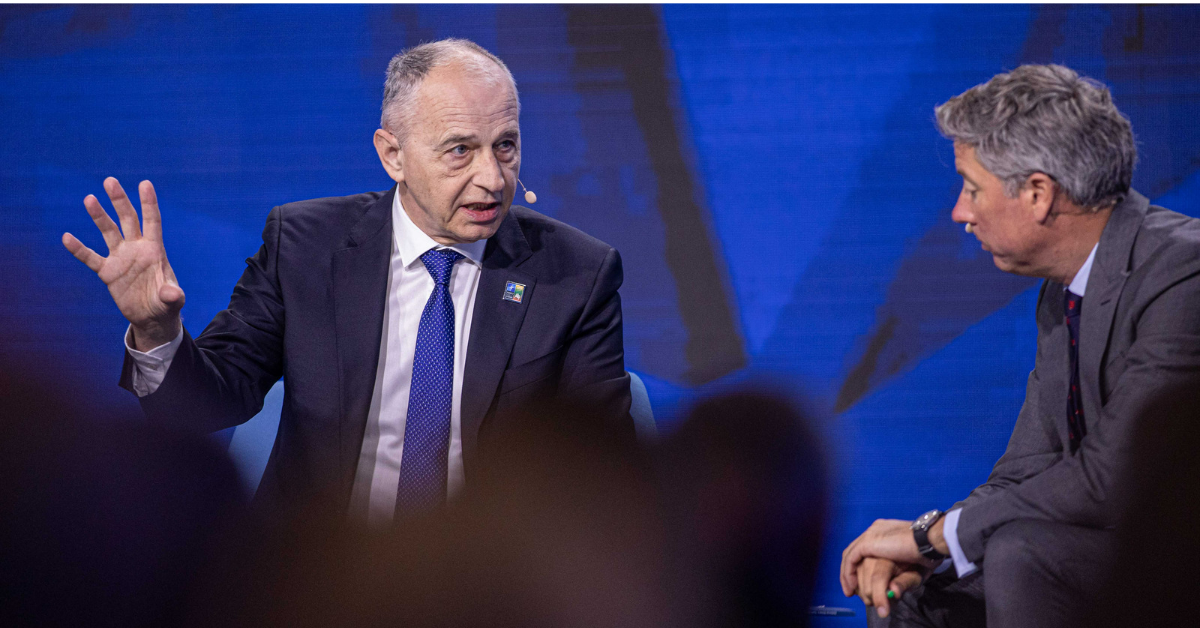
NGOs are working embedded in the Ministry of Defence of Ukraine like we do not do in NATO.
Over the last 20-25 years, many allies, especially European allies, have been collecting the peace dividend, and there was not so much need to invest in industrial base, in our militaries - now we need to do that.
There is a new geopolitical and geoeconomic reality around the world, not only in Europe, around the world. We’ve seen this with the pandemic, we’ve seen this with the financial crisis, now we are seeing it with the war in Europe, we are seeing a different landscape in geopolitics and geoeconomics.
The Vilnius summit will be remembered as one of the most successful summits we’ve had in some time and this is why we are here.
The very definition of security is changing dramatically: we have cyber, we have space and we have climate as space of security.
Moderated by Benedikt Franke, Vice-Chairman and CEO, Munich Security Conference
We at NATO, we in the alliance are certainly at crossroads when it comes to innovation. I’m wondering, are we taking the right turn, are we going in the right direction, are we learning the right lessons about innovation from the war in Ukraine?
A lot of us in Europe are sitting on the fence when it comes to defense particularly when it comes to investment. So how do we get more PLUTOs in Europe, how do we increase investment in innovation?
Standing up for Our Values: For Our Freedom and Yours
Petr Pavel, President, Czechia
The issue of values today is probably more important than ever. With regard to the security situation, both regional and global, values matter most. What we see ongoing in Ukraine is not just a regional conflict between two countries having a territorial dispute, it is about how we see the world: if we see the world working along the respect for the rules and the norms, if we see the world based on some common values, or if we see it as a world where a bigger stick matters more.
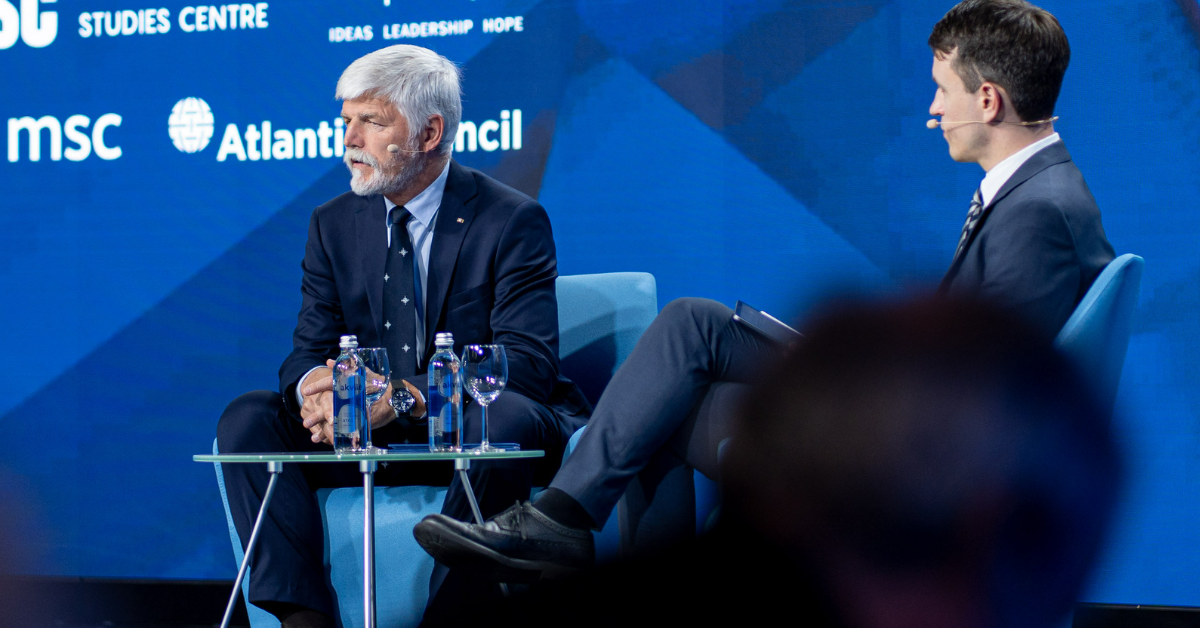
Ukraine is in the similar situation that my country experienced many years ago: Ukraine just wanted to be free in their decision in where to go, where to belong, which way of life to live.
It is our obligation to assist Ukraine in their fight against Russian aggression. If we allow Russia to prevail in this conflict, we would corrupt all the foundations our societies are built upon.
We are all responsible for how our region Europe will look like, what the European contribution to global security will be like.
Leaving Ukraine alone will only mean letting the problem get closer to us sooner or later.
Ukrainians do not have enough air power, they do not have enough ammunition to be really effective in pushing through, they do not have enough mine-breaching equipment… We can ask the question ourselves, have we provided enough resources to Ukraine to run counteroffensive that would be more successful?
Whatever is achieved by the end of this year will be the baseline for negotiation.
What Ukraine needs beyond equipment, ammunition or money is encouragement and assurance. This will maintain a high morale among Ukrainian forces. They need to see the light at the end of the tunnel. They need to see and feel motivation. They also need to feel that one day they will be welcome in the family. And we can give them such an assurance by simply saying: once the war is over, we will start the accession process.
When we heard from President Putin threats of using nuclear weapons our answer should have been: but we all have nuclear weapons.
Moderated by Linas Kojala, Director, EESC
Conversation with NATO Supreme Allied Commander Europe
Gen. Christopher G. Cavoli, NATO Supreme Allied Commander Europe
There’s been a need to modernize our collective defense system, rebuild some of it and modernize some of it. And that’s what the regional plans are about.
The conflict in Ukraine is a tremendous fountain of lessons for us to learn, both positive and negative. [...] One of the biggest that jumps out is cohesion.
The way Ukraine came together surprised us [...] everything came together and their cohesion has fostered bravery on the battlefield, has fostered commitment in the industry.
We discovered that the scale of the conflict requires an industrial base that is robust and responds with elasticity to surges in demand - that is a real lesson from this war.
Do I feel Russia is deterred? Yes, I believe we have accomplished our mission of deterring Russia from laying a finger on any part of the alliance.
Moderated by Katarzyna Pisarska, Chair, Warsaw Security Forum

Leaving No One Behind: the Human Security Imperative
Garry Kasparov, Chess Grandmaster
Whatever the name you use for his [Prigozhin’s] performance, mutiny, rebellion [...] I’ve been saying for a long time that analyzing Putin’s Russia we have to look for the godfather - it is a mafia state. Prigozhin’s challenge should be viewed from this angle.
There is a Saint-Petersburg mafia and many or some of them are now very much concerned about losing their businesses. They do not care about killing Ukrainians, Syrians, Africans, or whoever, even Russians. But they do care about losing their businesses.
More and more people within Putin’s inner circle are getting really concerned about Putin’s failed policies.
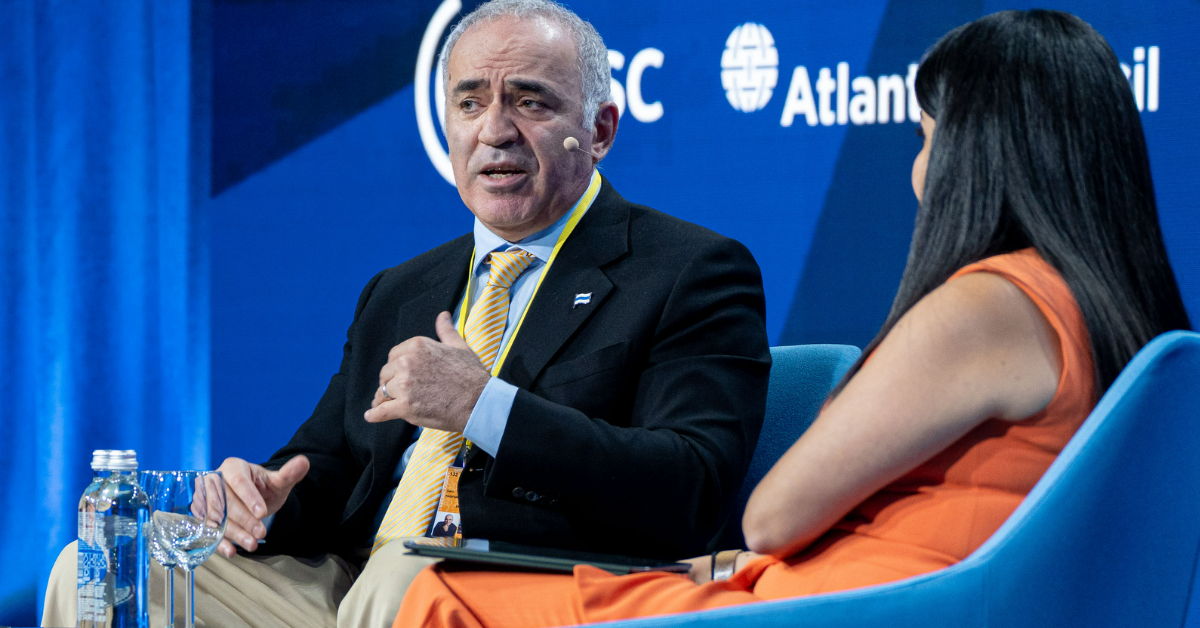
There is no civil society in Russia today. The regime spent decades taking control over the public space.
Putin’s propaganda made it very clear - it is not a war against Ukraine, it is a war against NATO.
The big debate here is whether it’s Russia’s war or Putin’s war. Unfortunately it is Russia’s war.
Putin’s propaganda made it very clear: it is not a war against Ukraine, it
Every Russian, including myself, has collective responsibility over the crimes committed in Ukraine.
We have no moral rights to criticize Ukrainians for whatever they do.
Moderated by Vivian Salama, National Security Reporter, Wall Street Journal
Conversation with Deputy Prime Minister and Minister of Foreign Affairs of Italy
Antonio Tajani, Deputy Prime Minister and Minister of Foreign Affairs of Italy
We are defending Ukraine because we want peace and justice.
Peace is to push out the Russians and reach an agreement.
We want to protect Europe, we want to protect Ukraine but we need to protect at the same time the Mediterranean region because the Wagner group is working hard in the Sub-Saharan region [and] there is Boko Haram, there are a lot of problems in Northern Africa. [...] Security is everywhere.
We are strongly engaged in NATO, we are ready to do more but please look at Italian engagement, because to have a lot of Italian soldiers everywhere is not easy, we pay a lot of money.
Migrants, terrorism, climate change, health problems, poverty - for that we need strong European engagement in Africa.
Ukraine will be part of the European Union, Ukraine will be part of our internal market, so it is crucial for us to work on reconstruction. [...] Reconstruction is crucial for sending a strong message by NATO, Europe, by us.
Security is a strong instrument for peace, we want to live in peace.
Moderated by Hadley Gamble, Anchor and Senior International Correspondent, CNBC
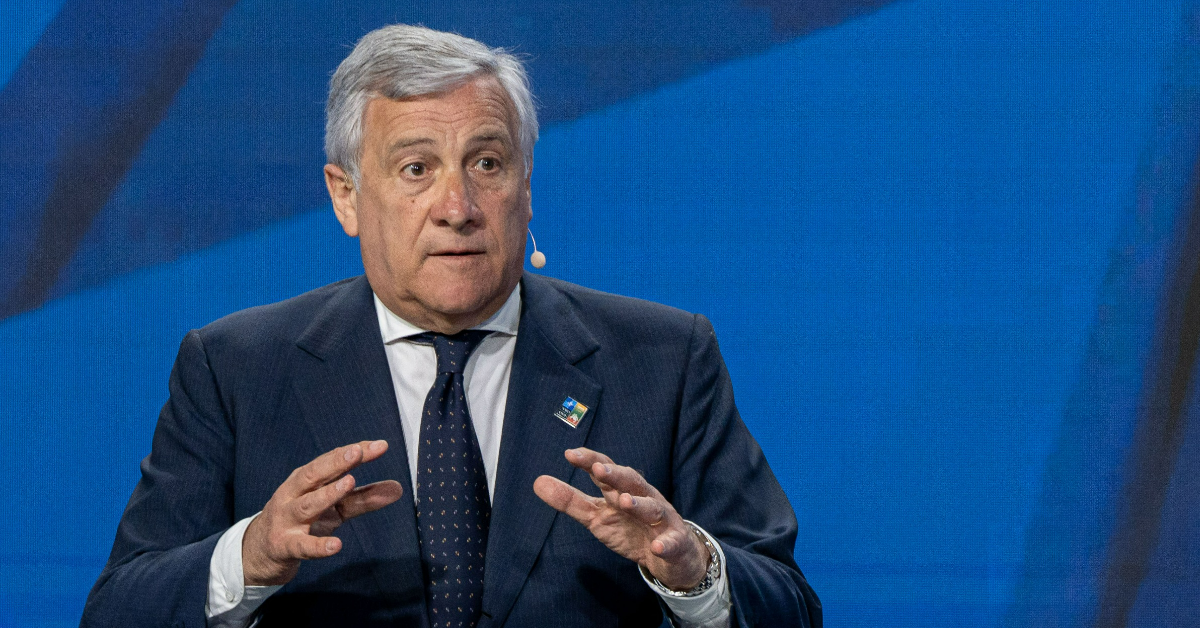
From Strategic Necessity to Economic Opportunity: Investing in Defence as a Commitment for the Future
Antti Häkkänen Minister of Defence, Finland
When it comes to the future steps, Nordic cooperation will deepen.
The big philosophy here is that Europe is taking higher responsibility for its own security matters. That's why we have to invest more and do it fast but also properly with quality and that’s the challenge.
We have to make the right decisions now and fast but the results are coming afterwards and that’s a message to the people.
Pål Jonson, Minister of Defence, Sweden
The message that came out yesterday was good for Sweden and it was good for NATO. It gives a strong signal to the whole Vilnius summit about the importance of cohesion and unity at this crucial time for the Euro-Atlantic security. We are ready to join NATO as a full-fledged member of the alliance as soon as possible.
2 % defense spending is a floor not the ceiling.
Security is like air: when you have it, you do not really miss it; but when it is disappearing there is nothing as important as getting it back.
A strong defense industrial base is actually a part of credible deterrence. That’s a lesson learned from the war in Ukraine. This is a war of warehouses. You have to have an industrial base.
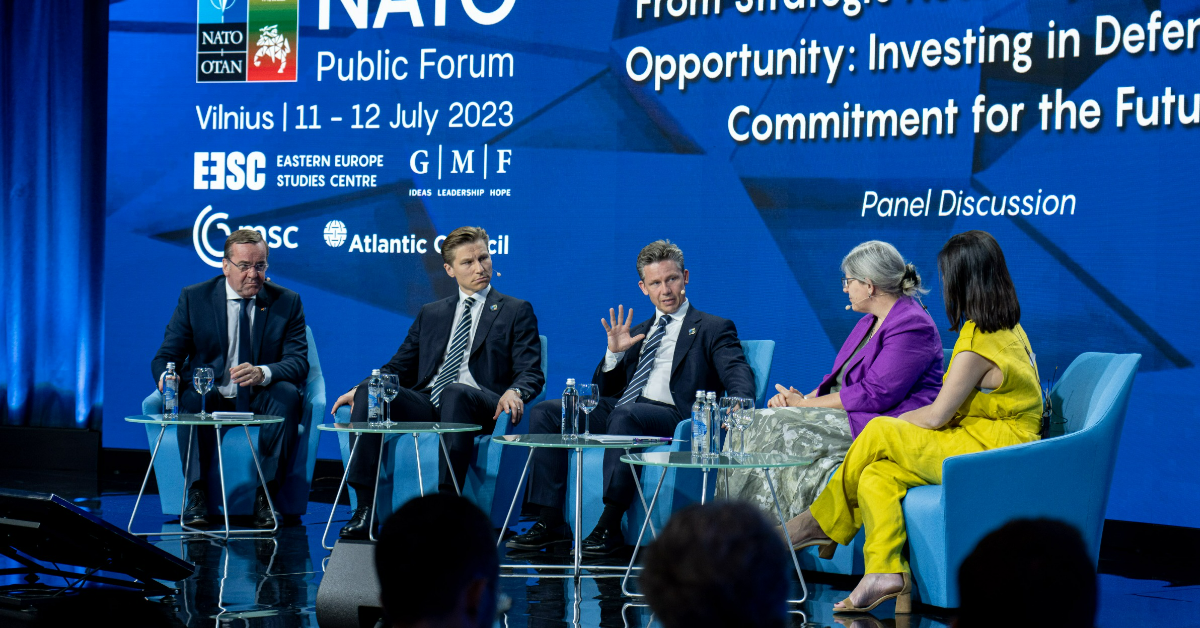
Wendy Gilmour, NATO Assistant Secretary General for Defence Investment
It's not so much talking about a ceiling, it’s talking about spending what we need to spend in order to ensure ourselves the deterrence and defense of the whole Euro-Atlantic area.
I honestly think that we all are capable of walking and chewing a gum at the same time if I can use that expression. We have three main tasks in front of us. We, as all of the nations of the alliance and outside of it, are helping Ukraine to win its war, to address illegal and unprovoked invasion of its sovereign territory. At the same time, as we are assisting Ukraine we have to replenish our own stockpiles and make sure that we continue to have what is a credible deterrence and defense for our own areas. And at the third time, we need to make sure that we are planning for the military capabilities that are agile, integrating the innovation.
Boris Pistorius, Federal Minister of Defence, Germany
We are standing on a firm base of 2 percent and then we have to try to reach the ceiling we can't even see.
We have to tell people in Germany, in Sweden, Finland and France and everywhere else what is the price of security, the price of what we are doing here, what is the price of deterrence and defense.
It is not really a matter of concrete and expressed invitation [...] it’s only a matter of the way to go there. There are certain preconditions and circumstances we need to take that step. [...] The future of Ukraine is in NATO.
The future of Ukraine is in NATO. There is no doubt about it. It is only a matter of how to go there but not.
Moderated by Maria Tadeo, Europe Correspondent, Bloomberg
Parliamentarians and Grassroots Support for NATO
Viktorija Čmilytė-Nielsen, Speaker of the Seimas
It [Russia’s brutal attack on Ukraine] is not just a regional problem, it is not just something that can be limited to just two countries or this area of the world but it is an attack on the well-established rule-based international order, among other things, it’s an assault on parliamentary democracy.
A very clear commitment to Ukraine on behalf of the alliance is something that is necessary today. A very clear commitment not just on the invitation and the membership but also on practical support, military support. Ukraine has to win and the sooner it wins, the better.
For the young generation right now there is no better example, no more emotionally compelling example than seeing their counterparts in Ukraine go to defend their motherland, their country, their freedom, their democratic future on the front or even unfortunately dying in completely brutal and also senseless terroristic attacks of Russia. If that cannot bring this urgency, then really nothing can.
If there is any silver lining to the brutal attack of Russia, it’s that newly founded, reinvigorated bond we have with our transatlantic partners.
Joëlle Garriaud-Maylam, French Senator, President of NATO Parliamentary Assembly
Obviously there are risks. We have populist movements all over Europe and they are growing. That’s a big worry for us. We’ve seen it recently in France. You must have seen in on the news. There is a lot of turmoil and we have to be very careful about that.
We have to explain over and over again what the challenges are for our common security.
We cannot not support Ukraine, we cannot not support this common defense and increase our defense spending.
We have a little network of very strong supporters of Russia. They are always the same, those who were against vaccination. The same people who are always against everything. And obviously now they support Russia.
We know there are problems, we know that within the NATO framework we cannot accept the country that is at war. It is a principle, so that’s why we need to win this war as soon as possible. We have to put all the efforts to help Ukraine win this war as soon as possible.
Democracy is so important, it’s a world that has been losing some of its appeal for many young people due to all of this disinformation.
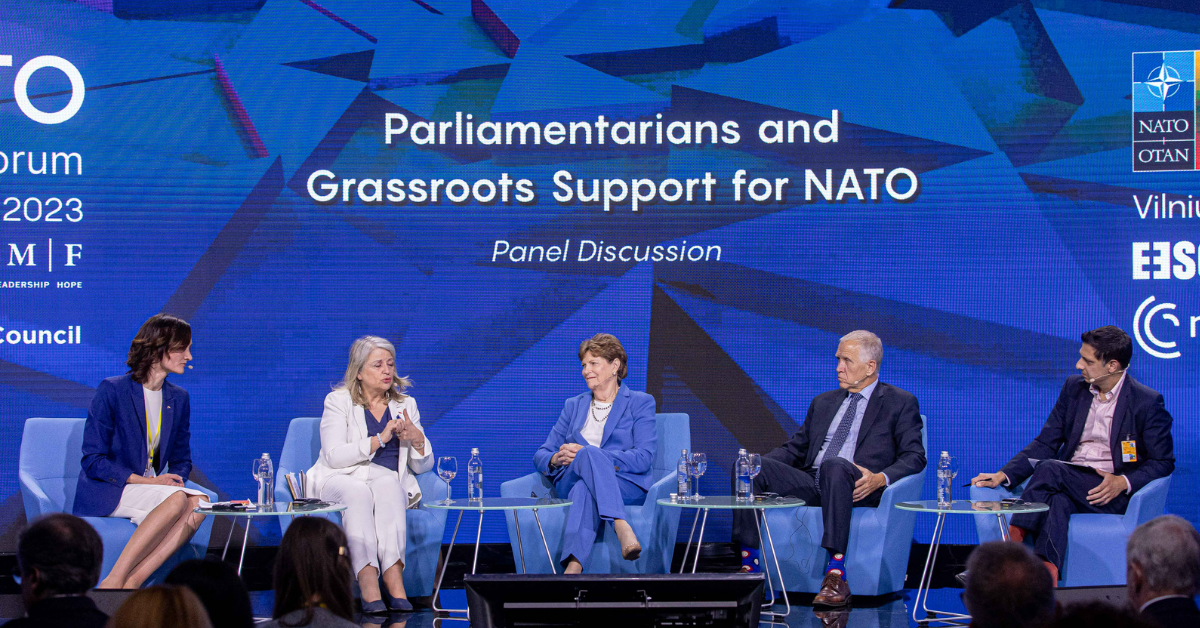
Jeanne Shaheen, US Senator, Co-chair of the Senate NATO Observers Group
We are here to show our support for NATO, to show our support for continuing to do everything we can to support the courageous Ukrainians in this unprovoked war with Russia.
After the fall of the Berlin Wall and the dissolution of the Soviet empire, we had what we called a peace dividend: we do not have to prepare to fight anymore, and we do not have to prepare for a conflict. This Ukrainian war has shown us very starkly that it is not the case, that we do have to prepare.
It’s gonna be much cheaper to defeat Vladimir Putin in Ukraine than if he comes to Lithuania, to the Baltics or Poland. I am concerned if he wins in Ukraine, he is not gonna stop and that’s gonna cost us a lot more money.
Thom Tillis, US Senator, Co-chair of the Senate NATO Observers Group
The single greatest political risk we have is not having the member nations of NATO satisfy not only the number but the capabilities.
Moderated by Shashank Joshi, Defence Editor, The Economist
A Talk with Civic Society Leaders: Unlocking Ukraine's Potential
David Cattler, NATO Assistant Secretary General for Intelligence and Security
Ukraine has tremendous potential. Ukraine has had tremendous potential and will have in the future when the war concludes as well. That I have no doubt of.
Hanna Shelest, Security Studies Program Director, PRISM Ukraine
Ukraine does not need its potential to be unlocked. Ukraine needs its potential not to be locked. [...] There are two ways to lock this potential. One is Russian aggression, because de facto their actions are locking the potential in terms of the development from the simple thing such as blocking the Black Sea ports, thus blocking our economic activities and maritime security. Yet, another thing, unfortunately, and I do not want to put the equal between them, but not inviting Ukraine and not making clear statements about Ukrainian membership is also locking.
When we speak about potential I would like to speak about amplification, about the joint potential, about the joint perspective. Otherwise, it will still be you and us. Everybody is discussing Ukraine as something like a nice doll on how to make it better but not speaking about the real action that can be taken.
Sometimes it is very hard to say what is the biggest problem for our partners: to act or even to start naming the things for what they are and through those changes of rhetoric to come to the changes of actions.
How many politicians in your countries use the words Russian aggression or Russian invasion instead of Ukrainian conflict? Or how many times per day do you hear Ukrainian war and Ukrainian conflict? That is wording, that really matters because it influences the action. When you don't name Russia, you exclude Russia like Russia is not guilty.
There are several groups that have not been engaged sufficiently. [...] Environmental groups are totally out of the conversation about this war. The blowing up of the Kachowka dam with its consequences on food security, environment, the Black Sea, etc. is a catastrophe in its scale close to the nuclear explosion. Yet, none of the organizations made statements.
Sławomir Debski, Director, Polish Institute of International Affairs
Ukraine defends what NATO is for. Ukraine defends international law, including the UN Charter. Ukraine proves that every nation has a right to self-defense and Ukraine proves that every nation has a right to call allies.
If we are talking about unlocking potential, it's not only about unlocking Ukraine’s potential, it’s about unlocking Europe’s potential or even transatlantic potential.
This war is about the future of Europe. Ukrainian victory would unlock the potential of Europe, the potential of transatlantic relations and would bring peace to all Europeans.
NATO is and has always been seen as an American alliance. [...] Naturally, the President of the United States will be seen as a leader of the free world at every summit, except this one. Here in Vilnius we have President Zelenskiy who is seen as a leader of the free world. He is coming here as a representative aspiring to become a member of NATO and influencing the agenda of the alliance.
Moderated by Kristine Berzina, Managing Director, GMF North
There is a wide-spread sense that the success and troubles of Ukraine are the success and troubles of the communities across the NATO allies.
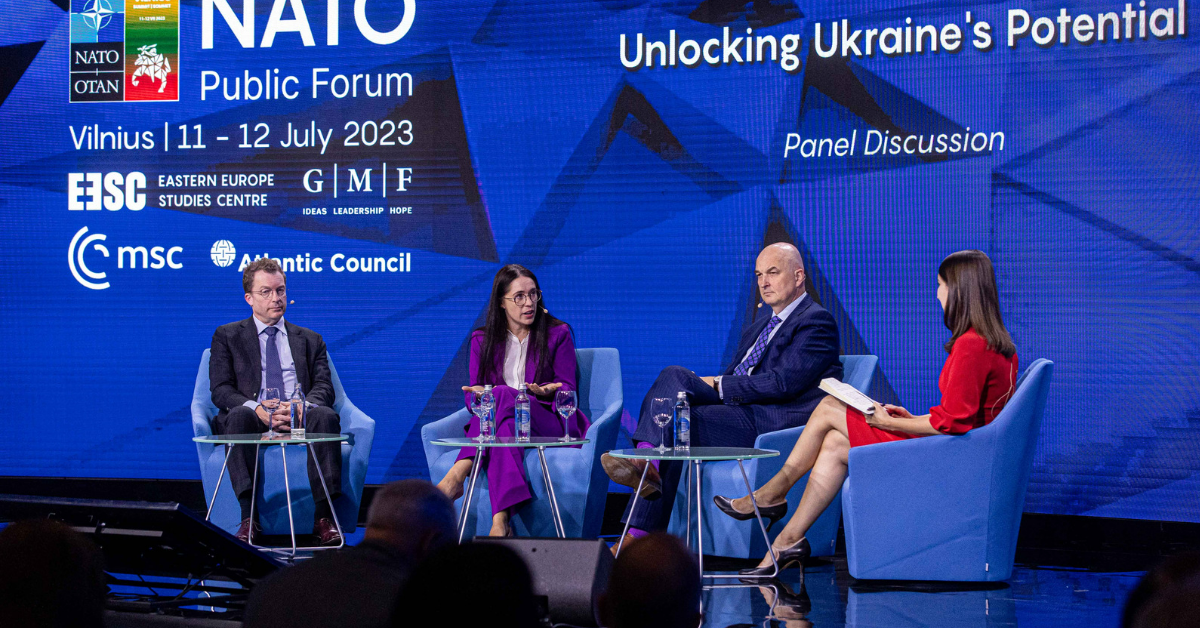
The Nexus of Stability and Deterrence: Reducing Risks in the Nuclear Age
Angus Lapsley, NATO Assistant Secretary General for Defence Policy and Planning
Nuclear is one of those areas where you should never be complacent and you should take everything seriously. And we do.
Moving nuclear weapons into Belarus would be an irresponsible step, there is no justification for it but it would not weaken our ability to deter an attack on NATO.
Nicolas Tenzer, Chair of CERAP, the Center for Studies and Research on Political Decision
The Russian blackmail worked and it allowed Putin, in fact, to win all his wars: in Georgia, before in Chechnya, in Syria, in a way also in Ukraine in 2014-2022.
The more we are hesitating, the more [...] the [nuclear] risk is increasing.
We must not underestimate the depths of Russian propaganda in the Western societies.
The nuclear threats coming from Russia are completely the same towards NATO as it is towards Ukraine.
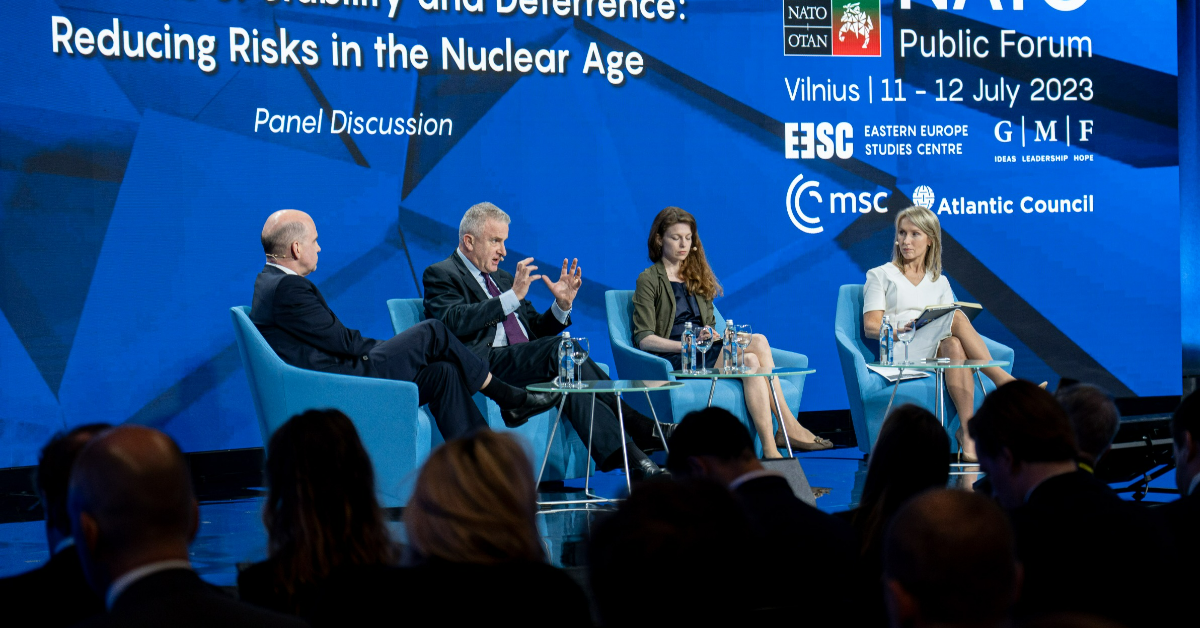
Julia Berghofer, Senior Policy Fellow, European Leadership Network
NATO itself is not doing any agreements, it is a platform for discussing risk reduction and arms control. NATO is not signing any arms control agreements.
We don't do arms control because we want to please others, but we want to be safe ourselves. The problem right now the arms control treaties as we all know them have eroded, we don't have that basis anymore, so we have to go back to the basics and the basics are risk reduction, like how can we avoid nuclear war?
How we shape deterrence, how we act will inform Chinese nuclear buildup or the way China is engaging in arms control in the future.
Moderated by Margarita Šešelgytė, Director, Institute of International Relations and Political Science, Vilnius University
China is looking very precisely at what is happening in Ukraine conventionally, how we are reacting to what is happening in Ukraine but also in terms of our nuclear messaging and our nuclear posture.
At the moment there is no appetite for arms control because we have to deter.
Moderated conversation with the Prime Minister of Netherlands
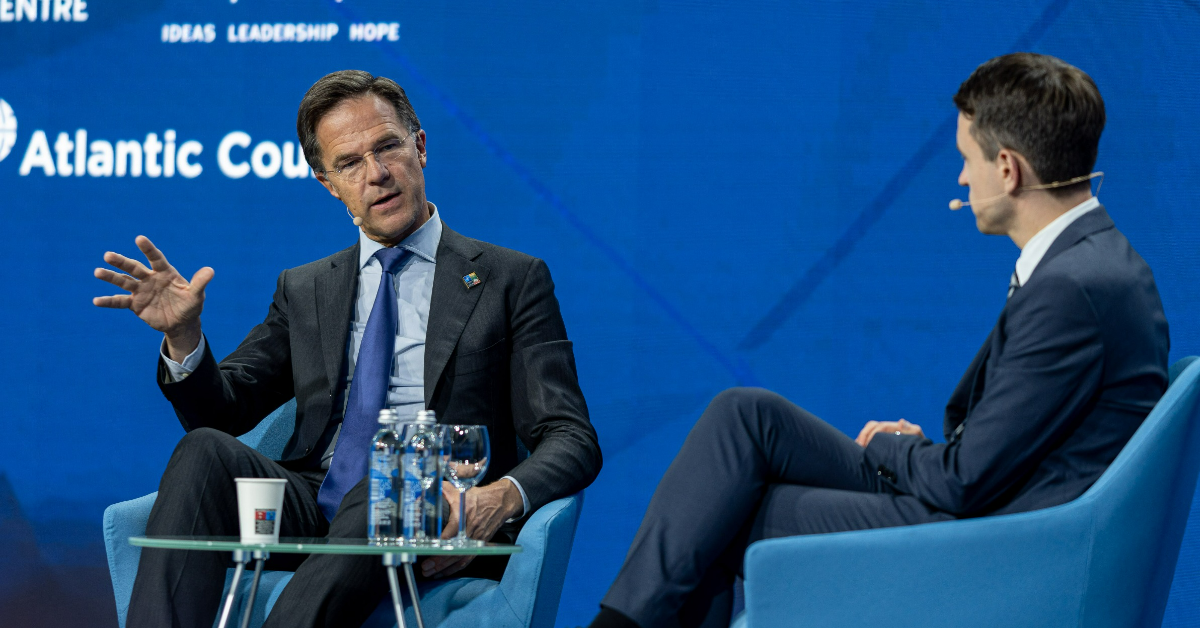
Mark Rutte, Prime Minister, the Netherlands
Unity - word number one - since the start and has always been there. And secondly acceleration. So we have been able to accelerate our support for Ukraine against the Russian aggression.
We are completely in agreement here: you do not recolonize another country in the world of 2022 and 2023. It is something we did in the 19th century, not in the 21st. The full-scale onslaught of Russia against Ukraine is unacceptable.
There will be days when Ukraine is not successful. Inevitably. There will be setback at the front. Particularly then we have to make sure that we all stick with them.
For F-16 to be really used by Ukrainians we need another yes of the Americans. So we had American yes on training, the next step of course has to be an American yes on actually making use of the F-16.
Moderated by Linas Kojala, EESC
Moderated Conversation with the Prime Minister of Albania
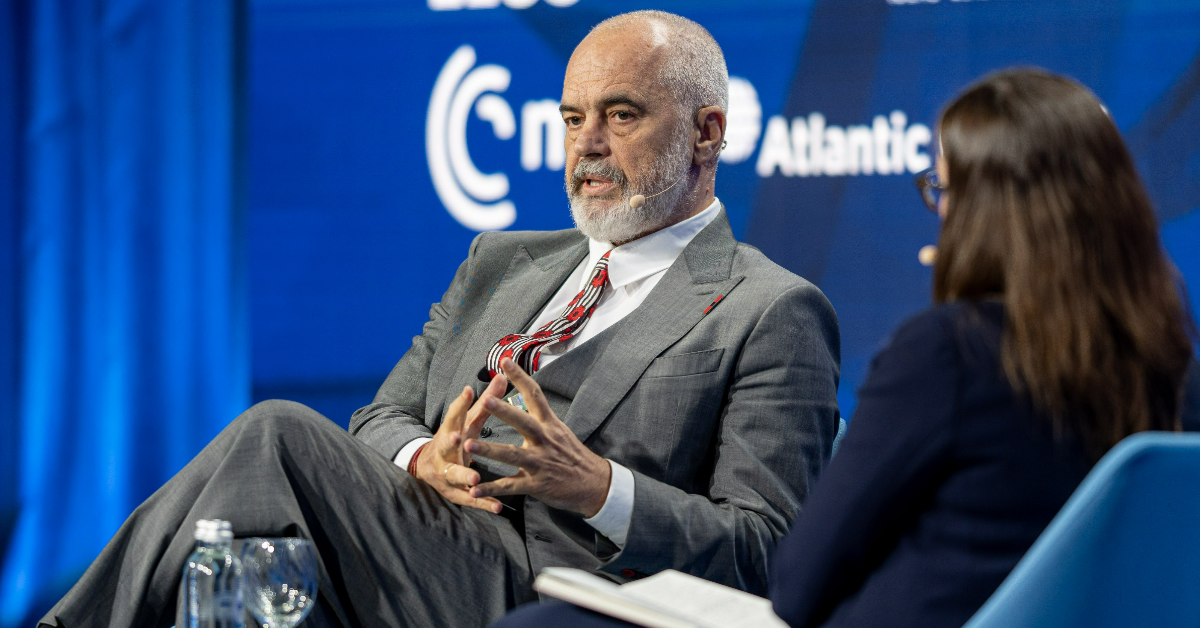
Edi Rama, Prime Minister, Albania
Being a champion when you do not have to take big decisions is easier. Albania is proud small member of NATO and its a place where we feel very good for many reasons. But I also feel good for one reason that it is not up to me to make the terrible big decisions.
Albania is a country where Vladimir Putin’s popularity fluctuates from 0.7 % to 1.2 %. So we do not have anything else but full understanding and a full support of the whole public opinion in Albania.
The big question is always how democracies can stand a dictator or a dictatorial regime in the conflict, because democracies have to fight but also listen to their people. Whereas Vladimir Putin has no one to listen to.
Both China and Russia are old marriages we do not want to go back to.
We can say whatever we want about the European Union. But one thing is sure: without the European Union we would not be able to do 90% of the things we have done in the last 30 years. And without the United States, that also have their own problems, of course, and we can also say whatever we want about it, we would not be able to survive as the Albanian nation.
Moderated by Rachel Rizzo, Nonresident Senior Fellow, Atlantic Council
Moderated Conversation: from Madrid to Vilnius
José Manuel Albares, Minister for Foreign Affairs, European Union and Cooperation, Spain
Unity continues. We are all united around Ukraine and around our values.
Since the fall of the Berlin wall, European partners have not been as united among ourselves as we are now.
For us NATO and the EU are not opposite things, they are complimentary.
Euro-Atlantic security is guaranteed by NATO and there is no substitution to NATO. And I do not wish to find a substitute for NATO. Yet, the Spanish government really believes in European defense being a strong pillar of NATO and at the same time being capable of acting autonomously if needed.
Things such as terrorism or the hybrid threats or irregular migrations or gas as we’ve seen in the eastern flank could very well happen in the southern flank so for all those reasons it’s very important first to be ready for that within NATO and second to reach out and to find partners in the southern flank so we can have a political dialogue and a better understanding.
We have to turn the Mediterranean into a bridge. At the end, we must acknowledge that both sides of the Mediterranean, the northern side and the southern side, must work together if we really want to tackle the main challenges.
In order to have strong NATO we need strong Europe.
Moderated by Christoph Heusgen, Chair, Munich Security Conference
NATO is not only about money. It’s also about capabilities.
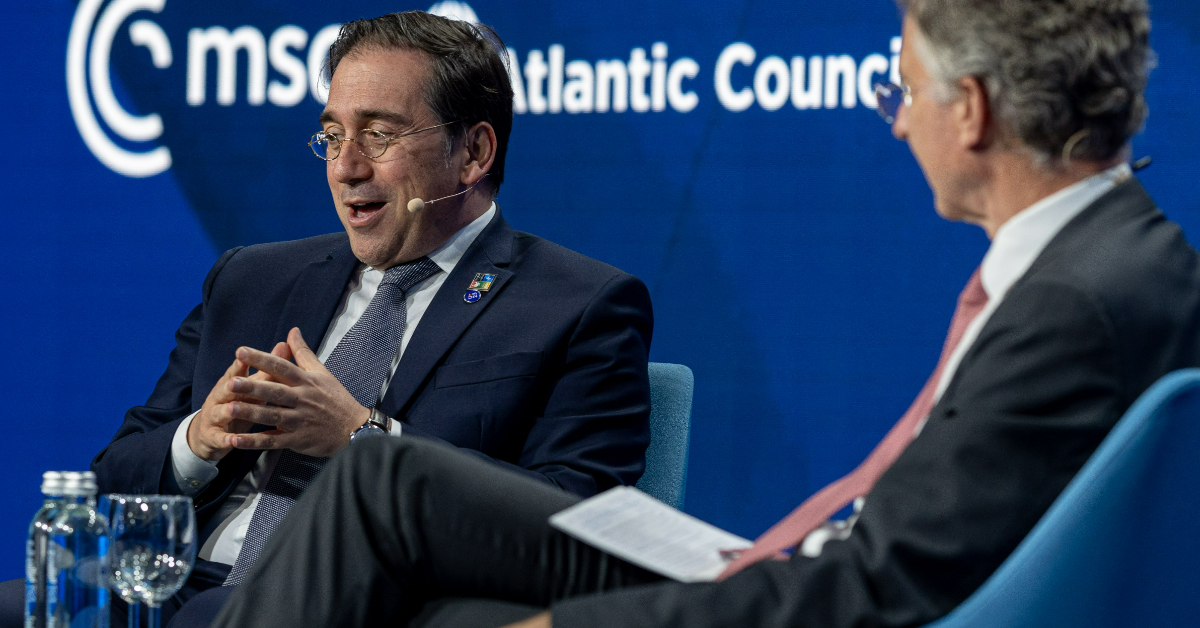
Rethinking China: a Shifting Paradigm?
Benedetta Berti, Head of Policy Planning, Office of the NATO Secretary General
It is the first time we have a transatlantic expression where we are on the systemic challenge that China poses.
We see more and more assertive authoritarian actors and they are pushing back against the rule-based international order. We see Russia and China very much on the forefront of that authoritarian pushback.
Sarah Kirchberger, Head, Asia-Pacific Strategy and Security (ISPK), Nonresident Senior Fellow, Atlantic Council
One thing people tend to completely overlook is China’s own relationship with Ukraine which is a very decisive factor in this whole equation. [...] China and Ukraine have also a very long standing and highly strategic relationship particularly until the Maidan Revolution. [...] Ukraine was a very very decisive partner for China delivering, for instance, highly sophisticated military technology that Russia was not willing to give.

Luis Simon, Senior Analyst and Director, Elcano Brussels Office
NATO and allied countries need more eyes and ears in the Indo-Pacific and that means more liaison teams and units at the political and military level.
It’s important that we start looking at China and the Indo-Pacific in a NATO context as they relate to NATO’s top priority right now, which is strategic competition.
Moderated by Una Berzina-Čerenkova, Head, Riga Stradins University China Studies Centre
Unpacking Day 1: Essential Takeaways
Róbert Vass, Founder and President, GLOBSEC
Some progress has been made concerning dropping the membership action plan, concerning some practical military support [...] and the political level on the NATO-Ukraine council. This sends a really strong signal to Ukraine.
Deterrence is not only in the physical space but also in the digital space. I think we also need more discussions about how we increase deterrence in the digital space.
It is clear we have to win at home in our countries in order to win in Ukraine.
Patricia Daehnhardt, Integrated Researcher, IPRI-NOVA
There is a growing awareness not only within the European NATO member states but also within the European and North American publics and public opinion that we all have to do more for defense.
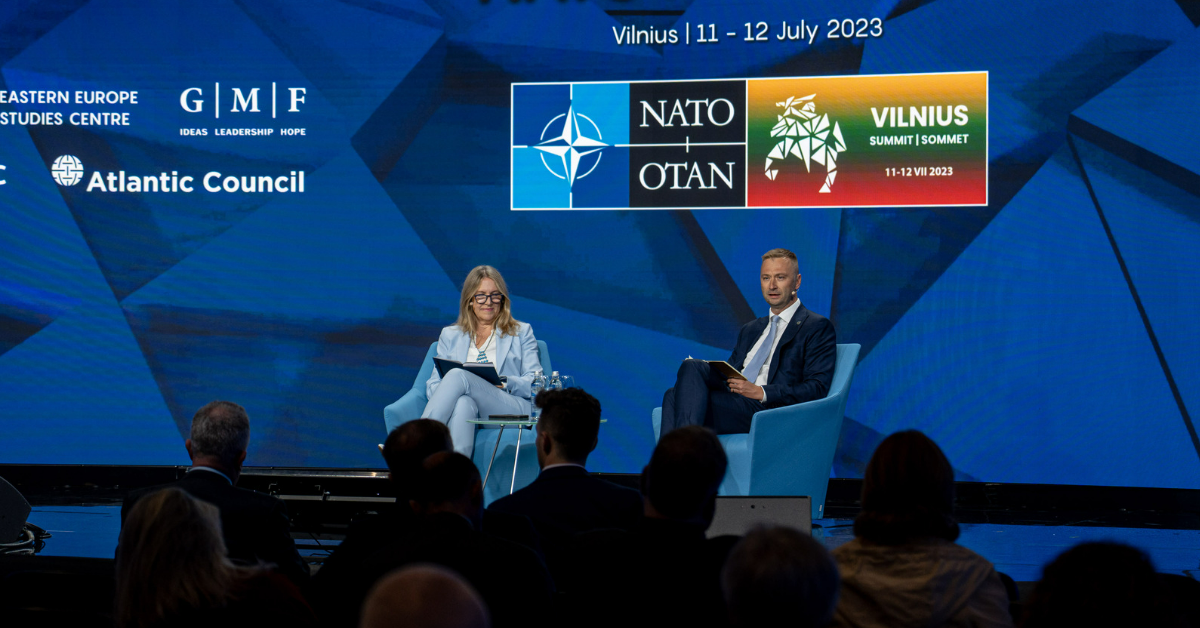
Day 2
High Level Dialogue on Climate. The Urgency of Now: Collaborating for Climate Action
Thórdís Kolbrún Reykfjörd Gylfadóttir, Minister of Foreign Affairs, Iceland
If we truly want to be independent from fossil fuels that means that we need alternatives. Those alternatives come from nature, they come from hydropower, or geopower, or wind or whatever. That means that they have an effect on nature. So being totally the purest in protecting the nature does not really sound credible.
What I think is important both for NATO, the alliance and the countries and for all of us to truly understand the consequences of these changes [of behavior].
We also need to both realize and [...] influence the changes geopolitically on the energy transition. [...] Which countries will be at the forefront when nations truly will go through with energy transition, where will that energy come from, from what sources, from what regions and what geopolitical influence will that have?
We need innovation and for that of course you need a clear policy so the industry and the money knows where we’re heading so they follow.
During this war, energy is being weaponized, trying to paralyze societies and loss of lives.
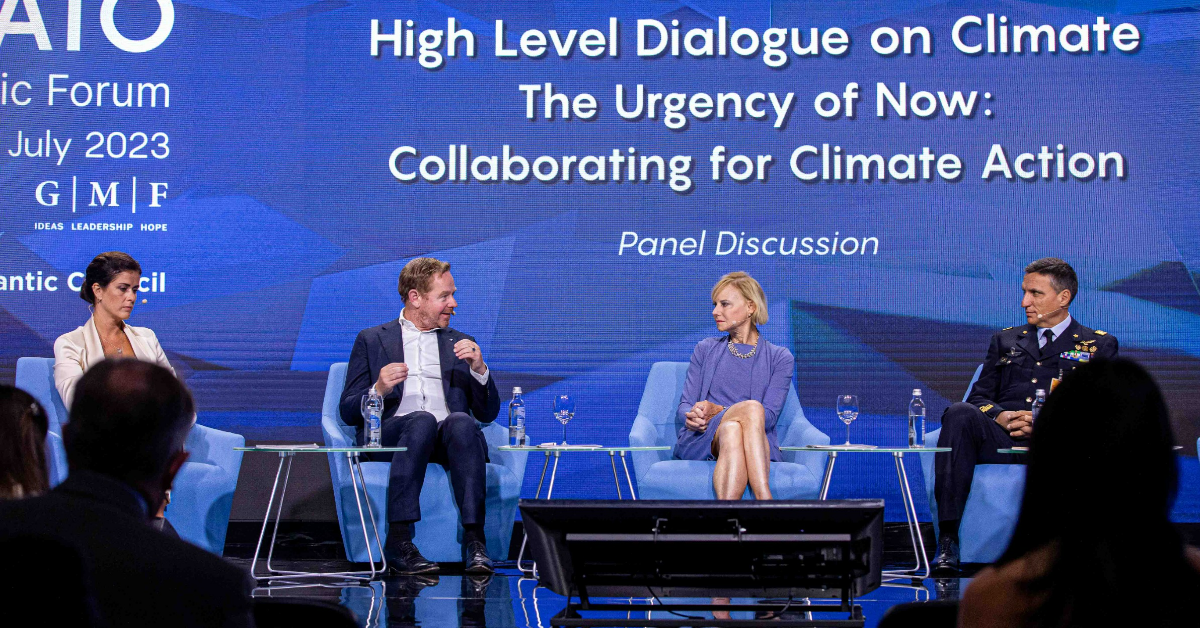
David van Weel, NATO Assistant Secretary General for Emerging Security Challenges
There is a great awareness within the militaries that the climate change is real and that it will lead to security implications. So from that perspective the negotiations are pretty easy. The question is how fast can we move and how ambitious can we be?
As civil society will transition away from fossil fuels, so will the military.
we can't stop using the equipment that we now have to protect ourselves. [...] We are going to be using it more as we are increasing our deterrence posture here in Europe. [...] That doesn't mean we can't look at the future and that we can't look at [...] the best practices that are already out there to make the current equipment more energy-efficient.
The consequences of the war in Ukraine are huge. Look at the Kakhovka Dam that was blown which made an impact in desertification and the loss of food production. The immediate impact on humans is enormous. And if something happens to Zaporizhzhia Nuclear Power Plant, it will be a huge disaster. So, I fully agree that there are huge challenges that we are facing at the moment.
Sherri Goodman, Chair of the Board, Secretary General, International Military Council on Climate and Security; Member of the Board of Directors, Atlantic Council
The challenge for NATO and really for militaries all around the world is can we adapt as fast as the climate is changing.
Increasing climate-fueled migration is going to affect societies in many ways and change the kind of missions our military is going to be undertaking.
Conversation with the National Security Advisor of the US
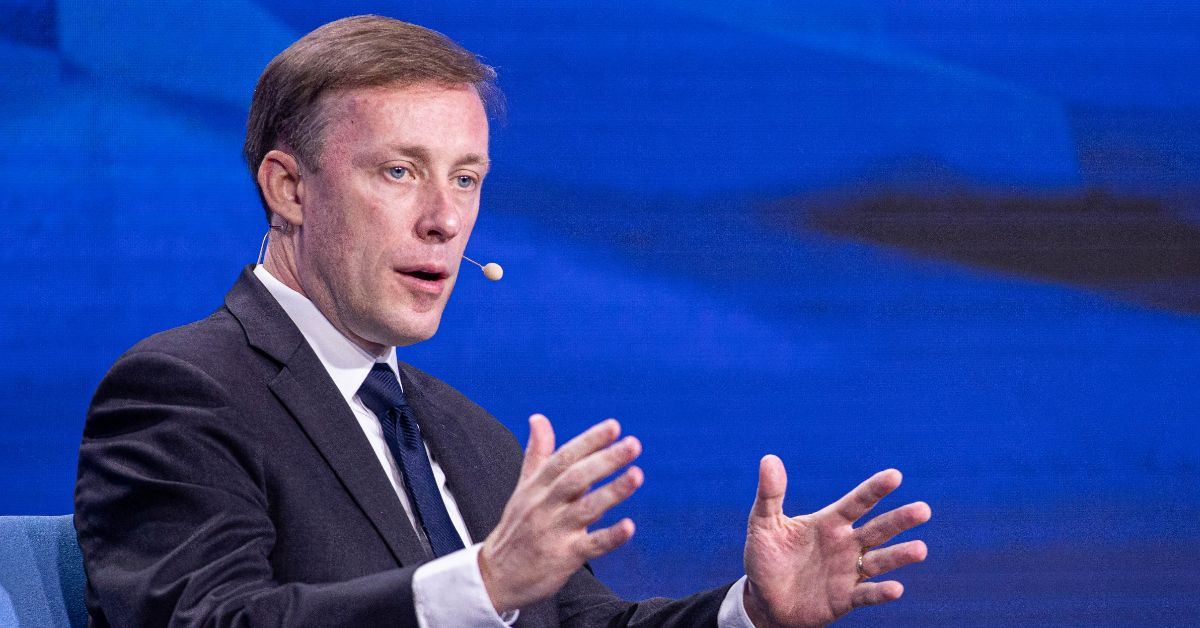
Jake Sullivan, the National Security Advisor of the US
The document [Vilnius Summit Communiqué] specifically says that the Ukraine’s future is in NATO. And it specifically says that the alliance will work with Ukraine along that way. And as Ukraine works along the pathway towards an invitation for membership, the United States and several other NATO allies and partners are going to step up today [...] to provide Ukraine with the security commitments it needs.
At the end of the day 31 soon to be 32 democracies with different perspectives, different capacities to bring to bear are going to debate and are going to have different perspectives, so unity cannot be defined as do we all agree on every element of everything from beginning to end. Unity is defined as taking all of those different perspectives and bringing them together around a coherent strategy based on deep principle and conviction, based on evidence and logic and that’s what we’ve done all the way through. So if Putin is sitting in the Kremlin and thinking ‘ah this is good for me’, he is going to be proven wrong once again because the alliance is going to come out of this summit united, purposeful, committed and energized.
The rest of the world is in awe of the bravery and courage of every Ukrainian citizen who is standing up in the face of Russia’s brutal war, brutal aggression, not just at the front line because the front lines have extended to cities and towns across Ukraine given the hell raining down from the skies in drones and missiles and other attacks of Russia.
Moderated by Moderated by Christoph Heusgen, Chair, Munich Security Conference
Tech Talk: Harnessing Emerging Technologies for Strategic Advantage
Ulrike Franke, Senior Policy Fellow, ECFR
I keep referring to this war as World War I with 21st century technology because we have this parallel of tranches and dragon teeth, but at the same time we do see a lot of drones in the sky. And I really want to say a lot drones and I mean A LOT OF DRONES.
I really want to note the technology in this Russian aggression of Ukraine as the enormously important role that private companies and private civilian companies are playing here.
We need close and closer links between private companies and the state in peace time, so if something happens you can hit the ground running. And this is something we can definitely learn from Ukrainians because the Ukrainian state has been incredibly good at communicating and working with private companies.
We need to look to Ukraine and learn from Ukraine on how to harness this involvement [of non-state actors], because Ukraine has been incredibly good at getting the public support, playing with the meme culture, working with NAFO and this kind of things. I am not sure if NATO or the EU, or states are able to do it to the same extent, so looking at how Ukraine has been doing that would be useful.
I think the most important thing for NATO and for our states is to get away from this distinction between this is the military [...] and this is all the civilian tech because that doesn't work anymore.
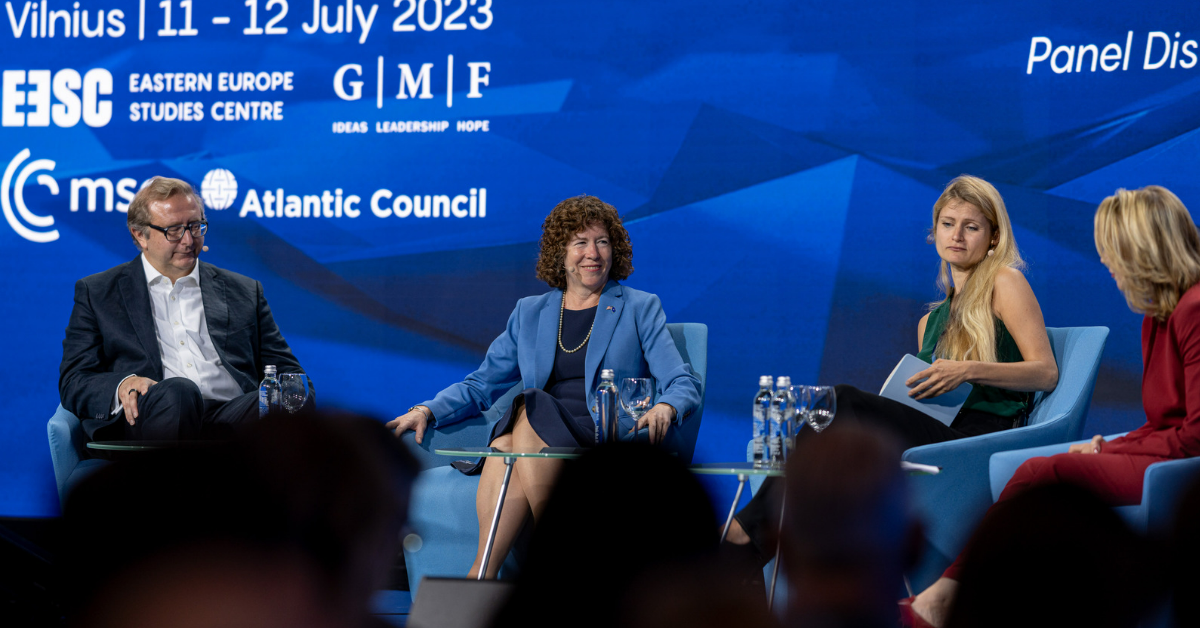
Andrea Traversone, Managing Partner, NATO Innovation Fund (NIF)
NATO was really brave and courageous as a supranational organization to realize and step in into this gap and lead with this [NATO Innovation] Fund and the DIANA activity.
We face a threat of competitive investment from adversaries and potential acquisition of these deep technologies by adversaries.
Barbara K. McQuiston, Chair of the Board of Directors, DIANA
We should be able to expand our definition of security technology [...] because we are talking about technology that has a broad base in energy, in climate [...] and there is a number of solutions out there - how do we tap in there and how do we inspire our citizens so they realize they have a path forward in working with these challenges going forward?
It’s going to be critical that we have a pace and an ability to work with the startup companies, to work with innovation and to work at a commercial pace and finance in a commercial framework so we can keep those companies engaged and working on the security issues that NATO sees across the alliance.
Moderated by Moderated by Teri Schultz, Freelance Reporter
Beyond the Blueprint: NATO's Strategic Concept in Practice
Luminita Odobescu, Minister of Foreign Affairs, Romania
What we’ve done today in the Summit Communique with an important paragraph for the Republic of Moldova I think is a step forward.
Ben Wallace, Secretary of State for Defence, UK
There is now a complete acceptance that Ukraine will join NATO, it’s not an if anymore, it is a when.
Ukraine is advancing every day. It might not be advancing to the timetable that people might have predicted. But it is capturing ground every day, it is costing the Russians to hold it.
Putin is a single man responsible for Sweden’s entry into NATO, he has been the best recruiting agent for NATO.
I do believe there will be a time in the nearest future, once we have helped you though this conflict, that Ukraine will join NATO.
Kajsa Ollongren, Minister of Defence, the Netherlands
Looking from a European perspective, having a more balanced NATO where the US will always be our most important partner and the strongest country, we have to live up to this expectation that we are also strong in Europe.
Moderated by Natasha Bertrand, National Security Reporter, CNN
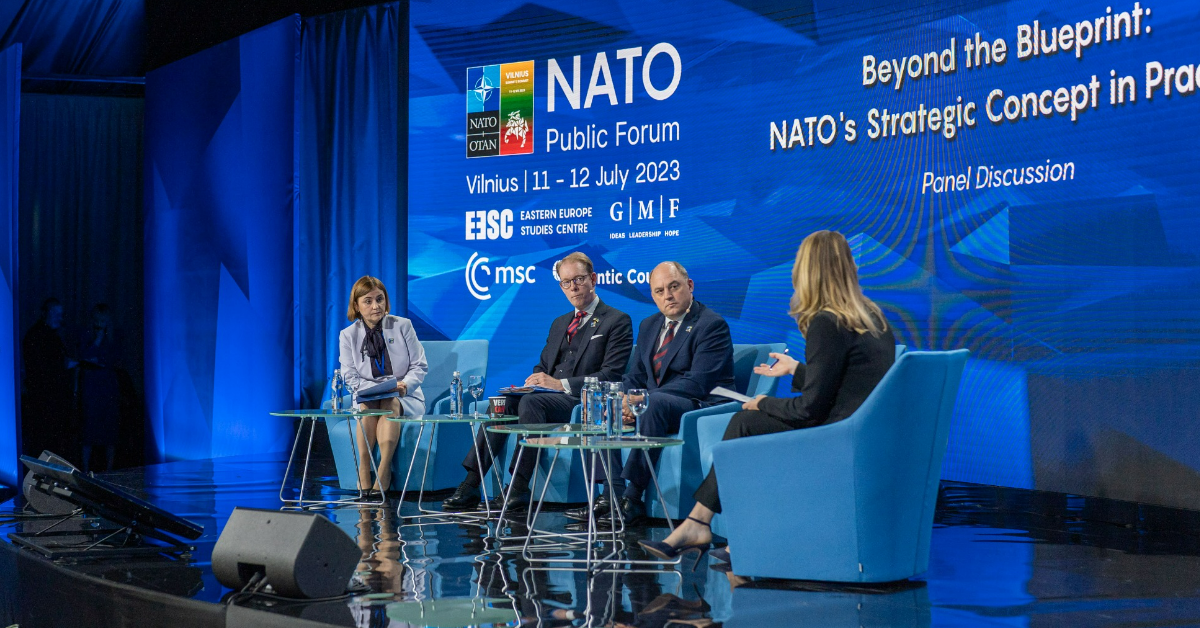
Bridging the Atlantic: Priorities for NATO's Future from Vilnius to Washington DC
Gabrielius Landsbergis, Minister of Foreign Affairs, Lithuania
Strategically we won, we have committed ourselves to Ukrainian membership in NATO, that’s the biggest achievement.
Next stop is Washington. We still have a full year, lots to do and I count on every single one of you to do your part, so that Washington is even more historical than Vilnius.
Andrii Yermak, Head of the Office of the President of Ukraine
It is a very very strong signal to the aggressor that first of all the alliance and the partners not just believe they are sure of our victory. Second, today is not finished and we are looking for some very serious results from the summit. [...]
All of us in Ukraine are living in a very specific reality, the reality of the war, and of course Ukrainians are looking at the summit for very concrete things.
We are not stopping our fighting, there is no force in existence that can make us stop till we liberate all our territories, we get back all our people and really win this war.
Moderated by Frederik Kempe, Chief Executive Officer, Atlantic Council
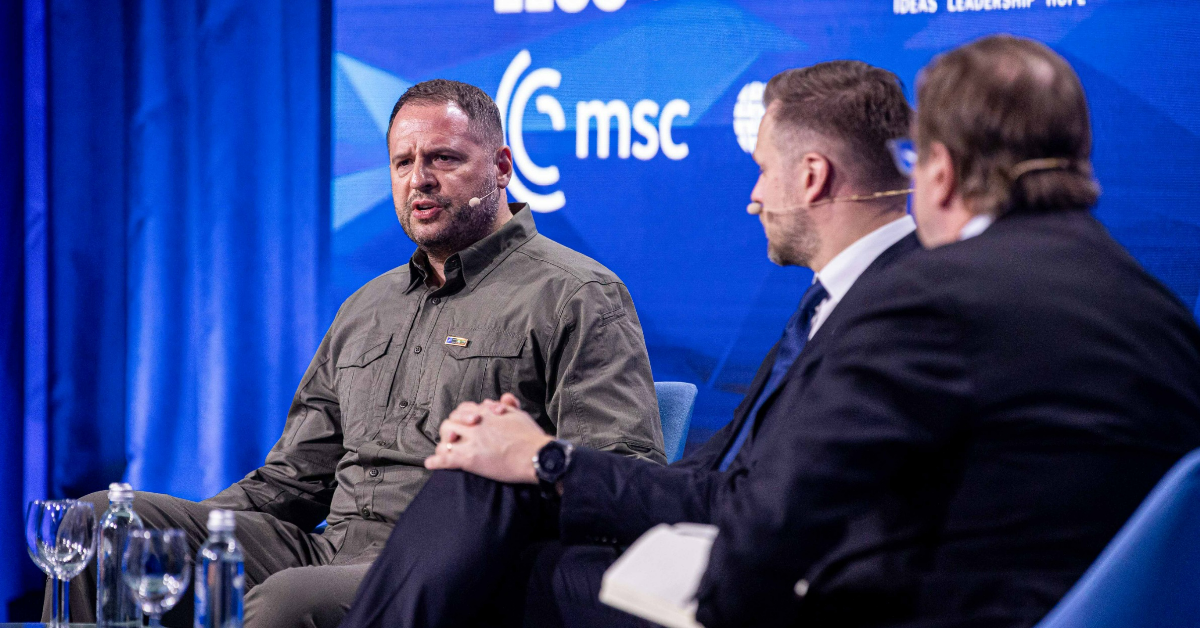
The Convergence of Risks: Raising Our Readiness for Hybrid Threats
Thanos Dokos, National Security Adviser to the Prime Minister of Greece
We are all too vulnerable, too exposed when it comes to interference when it comes to energy interconnectedness, communications; it’s the new threats [...] protecting and most importantly building resilience should be a major priority for all of us.
Moderated by Ian Lesser, Vice President German Marshall Fund
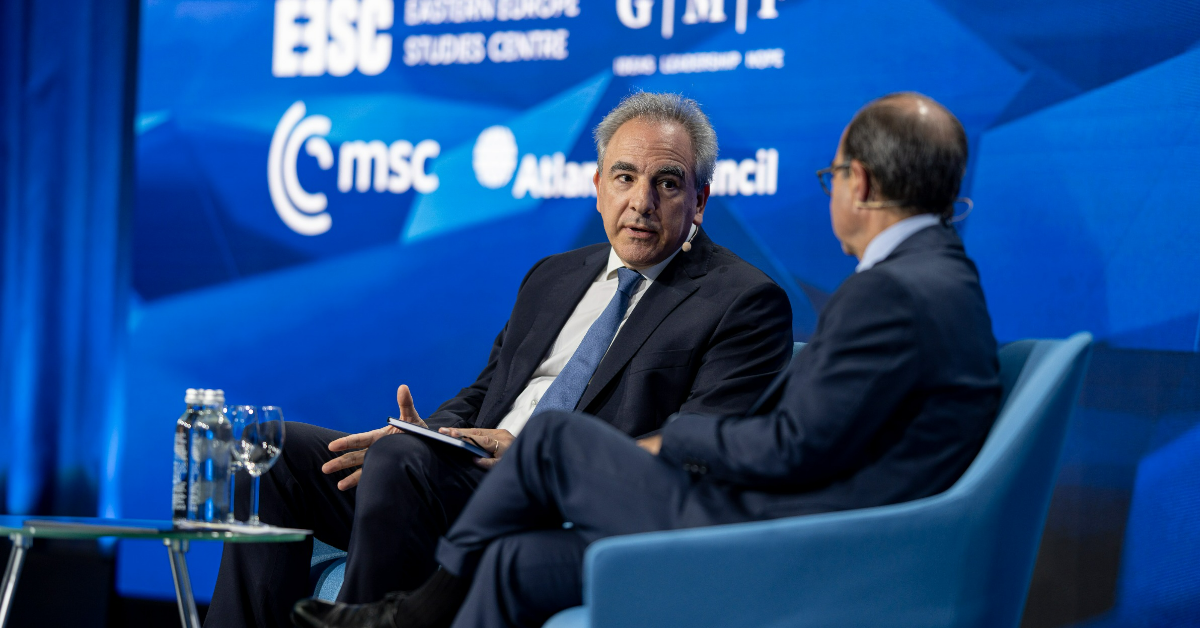
Closing Remarks
Carmen Romero, NATO Acting Assistant Secretary General for Public Diplomacy
The Vilnius Summit has made NATO stronger, much stronger than it was. Many important decisions have been taken. We are a consensus organization consisting 31 nations, soon to be 32 nations and therefore to achieve consensus is not easy. Nevertheless, we always agree on the core issues related to our shared security.
We are coming out of this summit with an unprecedented package that fortifies our defence to protect 1 billion people living in NATO countries. Our leaders have also taken unprecedented decisions to continue to support Ukraine. They have decided that Ukraine’s future is in NATO and they have prepared a support package as proof to help Ukraine become a member when conditions are met.
And we have upgraded to an unprecedented level the political dialogue with Ukraine, which is something that is not easy. President Zelensky is sitting as an equal with the other members of the NATO Ukraine Council, and this is really a big deal.
Our leaders have also met with the counterparts of the Asia-Pacific partners, because if there is something that the Russian invasion in Ukraine has shown, that security is not regional, it is really global and we have to work together to face the new security threats.
